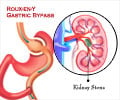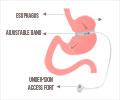General practices and primary care needs to be given to patients after bariatric or obesity surgery. Also, nutrition and pregnancy advises need to be given.

‘Family doctors can help with the patient's dietary practices like quantity and frequency of food intake to ensure sufficient nutrients in their diet.’





However, there is a lack of training and knowledge at general practice level to help deal with this issue. "Special knowledge and skill is required for clinicians so that they may deliver appropriate and effective care to patients post-surgery," explains Professor Luca Busetto, Associate Professor of Internal Medicine at University of Padova in Italy. Dr Busetto is co-chair of the EASO Obesity Management Task Force (OMTF)."Multidisciplinary long-term follow-up is recommended after bariatric surgery, and the provision of a suitable follow-up program is mandatory for bariatric centres. However, given the increasing number of obesity surgery patients, follow-up should be, at least in part, transferred to primary care over time."
He adds: "The major aim of our new guidelines is precisely this: to provide to all health care professionals involved in the care of post-obesity surgery patients all they need to provide appropriate first-level medical care to these particular patients."
Nutrition, the management of co-morbidities, pregnancy, psychological issues as well as weight regain prevention are all covered in these new guidelines. While they target general practitioners, patients having had obesity surgery may interact with obesity specialists, dieticians, nurses and other health care professionals not specifically trained in bariatric medicine and who are therefore not completely prepared to face unknown clinical problems in their professional practice.
"While of course we would expect complex issues to continue to be referred to obesity teams in hospitals, we believe that with dissemination of appropriate knowledge and training, many problems may be resolved in more basic and less expensive settings," says Dr Busetto. "This is the only way to cope with the increasing use of obesity surgery across Europe while simultaneously providing appropriate follow-up care and advice for patients."
Advertisement
The new guidelines say that blood tests on nutrient levels should be carried out every three to six months in the first year after surgery and every 12 months thereafter, and general practices could easily deal with such blood tests, while at the same time checking blood pressure and blood fats, and advising on any ongoing medication requirements such as drugs for type 2 diabetes.
Advertisement
The guidelines also highlight a crucial area where there is generally a low-level of knowledge in general practices: pregnancy after obesity surgery. "The majority of patients having obesity surgery are women, and up to 80% of these women are of child-bearing age," explains Dr Nathalie Farpour-Lambert, EASO President-Elect, and guidelines co-author.
"Obesity reduces fertility, yet following surgery a woman's fertility can increase immediately, and women and their family doctors must be made aware of this so appropriate family planning advice can be given."
She adds: "There are concerns with regard to conceiving during the period of rapid weight loss seen in the first 12-24 months following bariatric surgery, which is associated with higher rates of nutritional deficiencies and obstetric complications such as low birthweight, growth retardation and stillbirth. Pregnancy is hence not recommended during 12-18 months following surgery, so that the fetus is not affected by rapid maternal weight loss and so that the women can achieve her weight-loss goals. We also recommend that health professionals ensure antenatal care is offered at a specialised centre with experience in pregnancy following obesity surgery."
Another vital issue covered by the guidelines is the mental health of patients following surgery, and the very low but increased risk of suicidal ideation. Evidence has shown an excess of suicides among obesity surgery patients, with 30% of these occurring within two years and 70% within three years. There can be other severe mental health side-effects of surgery, including patients having unrealistic expectations from their surgery, and some may require therapy or another assistance.
Perhaps more well-known are the issues some obesity surgery patients encounter with alcohol, whereby the physiological changes caused by the surgery can make patients more susceptible to the effects of alcohol. It is easy to see how this can cause dependency issues in people who either drank a lot of alcohol pre-operatively, or in cases where increased risk of alcohol misuse after surgery could also be due to a shift of addictions, where alcohol substitutes food as a coping mechanism "Regardless of the alcohol history of the morbidly obese individual, all patients seeking obesity surgery should be educated on the potential risk of alcohol-related problems following the procedure," explains says Dr Busetto.
He concludes: "Follow-up during the first year should be at least every three months, starting one month post-operatively until a clinically satisfactory rate of weight loss is achieved. Thereafter, follow-up should be done annually. While up to now, much of this work has been done by multi-disciplinary teams in hospitals, this is no longer sustainable. Given the growing number of post-obesity surgery patients, an increasing part of the follow-up, particularly after the early period after surgery, should also be transferred to general practice physicians and to other primary care level obesity specialists, dieticians and nurses who are not part of the hospital team. This will decrease costs, mean fewer hospital visits for patients and help countries cope with the huge demands that obesity surgery is placing on their systems."
Source-Eurekalert









